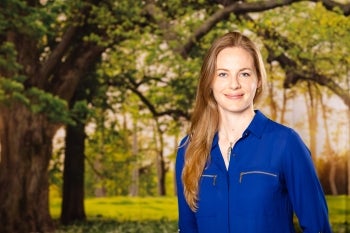Distinguished psychologists from Arizona State University’s Department of Psychology will receive top honors at the Society for Personality and Social Psychology (SPSP) 2024 annual convention taking place Feb. 8–10.
The upcoming SPSP awards ceremony will bestow the prestigious Donald T. Campbell Award to Professor Stephen G. West, acknowledging his enduring scholarly contributions and sustained excellence in social psychology. Alumna Cari Pick will receive the Student Publication Prize for her excellence in research, while father-and-son team Douglas Kenrick, a President’s Professor, and Psych for Life Creative Director David Lundberg-Kenrick will be celebrated with the Book Prize.
“We take great pride in the spirit of innovation, collaboration and outstanding research and teaching that define our community,” said Department of Psychology Chair Tamera Schneider. “These achievements not only honor individual accomplishments but also emphasize our collective effort to advance psychological understanding and the deployment of that understanding to serve society. We are proud to acknowledge and celebrate our esteemed colleagues at the upcoming SPSP convention and beyond as we continue our pursuit of excellence in psychological research and education.”
Donald T. Campbell Award: Stephen West
First given in 1980, the Donald T. Campbell Award honors outstanding and lasting scholarly achievement in the field of social psychology research throughout one’s career. Notable past recipients include luminaries such as ASU’s very own Regent’s Professor Emeritus Robert Cialdini.
While nearly all Donald T. Campbell Award recipients are celebrated for their contributions to theory and empirical research, West stands out for his pioneering work in advancing research methods. His professional journey mirrors that of Campbell, featuring early contributions in basic social psychology followed by significant strides in quantitative research methods and applied research.
Humbled and honored by the recognition, West emphasizes the intricate dance among theory, data and methods that leads to scientific advances. His collaborative efforts, particularly with President’s Professor Emerita Leona Aiken, have resulted in widely adopted approaches across various statistical models, from multiple regression to structural equation modeling.
West boasts an impressive record, co-authoring 170 articles, 30 chapters and 13 books and editing volumes that have resulted in over 190,000 citations. Beyond research, his impact extends to editorial roles for methodological and substantive journals like “Journal of Personality,” "Psychological Methods,” “Multivariate Behavioral Research” and “Evaluation Review.”
Reflecting on his journey, West shares insights from his graduate school days at the University of Texas at Austin, encapsulated by the observation of his distinguished senior quantitative mentor, Quinn McNemar, in a letter of recommendation: “This boy has talent. If he can decide what he wants to be when he grows up, he might amount to something.” West adds, “I am not sure I ever really decided what I would do when I grew up. In the words of the famous statistician John Tukey, ‘The best thing about being a statistician is that you get to play in everyone else’s backyards.’”
Joining ASU in 1981, West’s influence has been instrumental in developing applied research projects, contributing to the founding of ASU’s Prevention Intervention Research Center (now known as the REACH Institute) and helping launch ASU’s doctoral psychology program for quantitative research methods. His mentorship approach involves guiding students to identify topics of strong interest and encouraging advisees to work with multiple faculty members to gain a breadth of perspective in their research. West has been advisor or co-advisor to over 30 students granted PhDs at ASU, six of whom have gone on to receive early-career awards from national societies.
West’s dedication to teaching and mentoring has earned him awards such as the ASU psychology department’s Graduate Student Mentor of the Year (1984), ASU's Graduate School Outstanding Graduate Mentor (1997), the American Psychological Association’s (APA) Jacob Cohen Award for Distinguished Contributions to Teaching and Mentoring (2006), and the APA Board of Educational Affairs Outstanding Graduate Teaching of Psychology as a core STEM Discipline Award (2017).
In the realm of research, West’s accolades include APA’s Henry A. Murray Award for lifetime contributions to the study of lives (2000), the Alexander von Humboldt Foundation Research Award for lifetime contributions to quantitative research methods (2009), Society for Multivariate Experimental Psychology’s Sail B. Sells Award for distinguished lifetime contributions to multivariate research (2011), and APA’s Samuel J. Messick Distinguished Scientific Contributions Award for a distinguished history of scientific contributions within the field of quantitative research methods (2017).
West's service to the field is exemplified by the Herb Eber award for distinguished service to the Society for Multivariate Experimental Psychology (2017).
He expressed gratitude for the freedom ASU provides him in exploring diverse areas within and outside of psychology.
“The psychology department has maintained a high level of congeniality and support that I have not experienced in other departments in the U.S. and abroad. I have had the experience of learning from a number of colleagues over the years. I have had a number of wonderful teachers and mentors at ASU, including several who came disguised as students,” West said.
Student Publication Prize: Cari Pick
ASU alumna Cari Pick, now a postdoctoral fellow at the Environmental Defense Fund, is set to receive the SPSP Student Publication Prize for her research on social testing as a pervasive human social practice. In collaboration with Foundation Professor Steven Neuberg, Pick co-authored the “Observation-Testing Model,” offering valuable insights into predicting human behavior.
The observation-testing model, inspired by the continuous effort to comprehend and anticipate the actions of those around us, sheds light on when, why and how people engage in "testing" behavior to unveil true identities in situations where observations alone fall short.
Initiations, or "tests," such as a job interview or a first date, are constructed, non-natural situations allowing individuals to gather additional information. Neuberg explained, “For instance, you pose a crazy idea to see how people react. That’s what this paper is about: How do you change situations around people when you need to have information about them right away?”
“We want to know who we can trust, who would be a good friend or romantic partner, who would make a skilled employee and more,” Pick said. “Since developing the model, I’ve noticed countless examples of testing behavior — from adults, children and even animals — in my own experiences and illustrated around me in movies, books, memes and online videos.”
Pick, who also volunteered and worked for the Peace Corps before coming to ASU, highlighted how her education shaped her continued success and growth in the field.
“I was fortunate to work with a number of excellent mentors during my PhD training, including my co-author on this paper, Steve Neuberg," Pick said. “I received rigorous training in experimental methods and statistical analysis during my time at ASU while also learning to think critically about and expand on current social psychology theory. My training has continued at the Environmental Defense Fund, where I have had the opportunity to think more systematically about how to apply research findings to addressing real-world problems, such as the climate crisis.”
Book Prize: Douglas Kenrick and David Lundberg-Kenrick
The coveted SPSP Book Prize for the Promotion of Social and Personality Science finds its deserving recipients in the father-son pair of Douglas Kenrick and David Lundberg-Kenrick. Their acclaimed book, “Solving Modern Problems with a Stone-Age Brain,” digs into the timeless challenges faced by humans and how ancient solutions often fall short in the contemporary world.
Addressing fundamental human concerns like survival, protection, social relationships and more, Kenrick emphasizes the need to adapt outdated ancestral solutions to the complexities of the modern era. Originally conceived as a series of videos exploring how fundamental motives manifest in movies, the book draws on Lundberg-Kenrick’s expertise in film and media. He shares, “The struggle to balance or achieve these various goals is at the heart of all drama. I’ve always been interested in what motivates characters and human beings.”
The book offers psychological insights and practical strategies to navigate challenges arising from the incompatibility of ancient motives with the demands of life today. For Kenrick, a distinguished psychologist, the SPSP Book Award holds a special significance, and he considers it one of the highest honors he has received. Sharing the award with his son adds a unique and cherished dimension to the achievement. He notes the rarity of winning this award among the accomplished 7,500 members of the SPSP.
“About 7,499 of those 7,500 social psychologists have thought about writing a book explaining their findings to the public, and about 749 of them have actually written a popular press book, but only a dozen have ever won this award. So it is high praise that this particular group chose our book to win this award,” Kenrick said.
“It’s a rush,” Lundberg-Kenrick said. “This book is all based around a pyramid of motives developed by people connected to ASU — two faculty members (Douglas Kenrick and Steve Neuberg) and two former grad students (Vlad Griskevicius and Mark Schaller) — and it represents a focus on what Bob Cialdini calls ‘full-cycle psychology,’ which is basically taking findings from psychology and figuring out how people can use them to improve their life. This book owes a lot to ASU.”
More Science and technology

Diagnosing data corruption
You are in your doctor’s office for your annual physical and you notice the change. This year, your doctor no longer has your health history in five-inch stack of paperwork fastened together with…
Large-scale study reveals true impact of ASU VR lab on science education
Students at Arizona State University love the Dreamscape Learn virtual reality biology experiences, and the intense engagement it creates is leading to higher grades and more persistence for biology…

ASU-led space telescope is ready to fly
The Star Planet Activity Research CubeSat, or SPARCS, a small space telescope that will monitor the flares and sunspot activity of low-mass stars, has now passed its pre-shipment review by NASA.…





